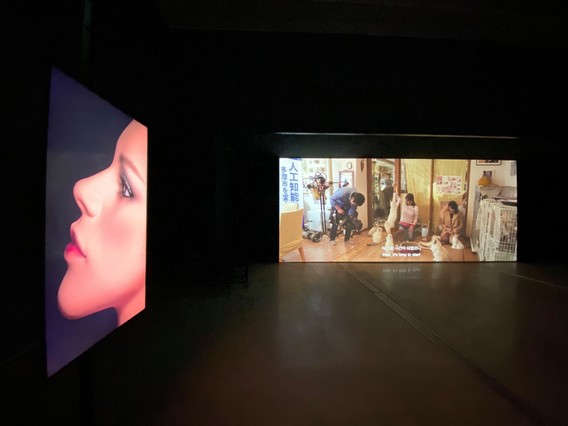
R
E
V N
E
X
T
A project on the manufacture and consumption of sex dolls has proved too risqué for audiences at the National Museum of Modern and Contemporary Art, Seoul (MMCA). Presented in the 2020 Korea Artist Prize exhibition, finalist Jung Yoonsuk’s Tomorrow (2020), a two-hour documentary film accompanied by a series of lightbox photographs and moving-image installations, has attracted a slew of complaints posted to the MMCA’s social media, including calls to remove the work from public view.
On December 8, four days after the exhibition’s opening, MMCA shared photos on Facebook, Twitter, and Instagram introducing Jung’s project, as the institution typically does for each of the Korea Artist Prize nominees. The installation views feature the artist’s lightboxes depicting close-ups of doll faces and arms, as well as images of Chinese workers at a factory that manufactures the sex toys.
Shortly after MMCA published the posts, members of the South Korean public began airing their views in the comment sections, with MMCA’s Instagram account bearing the brunt of the furore. “Is the National Museum of Modern and Contemporary Art formally defending rape dolls? Don’t package rape and sexual objectification as art,” said user @reddish_jeans. “This is how Korea thinks of women now,” remarked @matilda_hee. In response to the outcry, MMCA posted a statement in the comment section defending Jung’s project as “a documentary work that casts a critical gaze on the current social issue of buying and selling human dolls,” and welcoming viewers’ critique and discussion.
An anonymous MMCA official told The Korea Herald: “We are aware of the ongoing controversy about the works, but it is not appropriate to withdraw the works at this moment. It is a museum’s role to accept a variety of criticisms and opinions about artworks.”
Public outrage over South Korea’s rampant misogyny has been front and center in recent weeks as a result of the high-profile criminal case against Cho Joo-bin, the 25-year-old leader of a blackmail ring on the social-messaging app Telegram that targeted young and underaged women. On November 26, a week before the MMCA show opened, Cho was sentenced to 40 years in prison for charges including the production and distribution of illegal sexual visual material, sexual abuse, rape, and violation of private information, among others.
The 2020 Korea Artist Prize exhibition at MMCA Seoul is currently closed until at least December 18 due to tightened restrictions on public gatherings in Seoul following a surge in Covid-19 infections.
Ophelia Lai is ArtAsiaPacific’s associate editor.
To read more of ArtAsiaPacific’s articles, visit our Digital Library.













